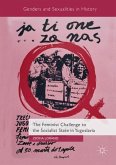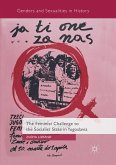"This book is very timely: the instrumentalization of history for political goals has become a pressing issue and worrisome feature of many polities, to the point of challenging even the most consolidated democracies. Focusing on Yugoslavia's fragile successor states, the authors explore plurifold analytical levels, including local, regional, transnational, European and global perspectives. The authors comprehensively demonstrate how politicizing history, in the postwar and postcommunist societies of what was once Yugoslavia, has prevented both reconciliation and democratization."
-Sabine Rutar, Leibniz Institute for East and Southeast European Studies, Germany
"Ognjenovic and Jozelic focus here on the former Yugoslavia before and after its fragmentation to explore and evaluate the various uses of histories by nationalists, both those who promoted 'federal nationalism' and those who peddle specific local nationalisms in successor states. The book deals specifically with the Western Balkans, but these developments have their parallels in many other parts of the world, and the book will be useful well beyond the region on which the study is based."
-Paul Mojzes, Professor Emeritus, Rosemont College, USA
"The former Yugoslavia has become a battlefield for the 'Memory Wars', in spite of the wealth of judicially established facts and available evidences gathered about the atrocities in the region, and various initiatives aimed at dealing with the past and efforts at transitional justice. Focusing on three periods of Yugoslav history - the Second World War, socialist Yugoslavia and the Yugoslav wars of 1991-2001 - the contributors show that despite these efforts to deal with the past, sustainable peace and reconciliation across ethnic and religious groups remain a distant aim."
-Marijana Toma, Center for Cultural Decontamination, Serbia
This book analyzes how nationalists in the former Yugoslavia have politicized history to further their political agendas, retaining and prolonging conflict among different cultural and religious groups, and impeding the process of lasting reconciliation. It explores how narratives have been (mis)used, drawing on examples from all of the former Yugoslav republics. With contributors from a range of disciplinary backgrounds, it provides a vital assessment of how nationalists have attempted to (re)shape public collective memory and relativize facts.
-Sabine Rutar, Leibniz Institute for East and Southeast European Studies, Germany
"Ognjenovic and Jozelic focus here on the former Yugoslavia before and after its fragmentation to explore and evaluate the various uses of histories by nationalists, both those who promoted 'federal nationalism' and those who peddle specific local nationalisms in successor states. The book deals specifically with the Western Balkans, but these developments have their parallels in many other parts of the world, and the book will be useful well beyond the region on which the study is based."
-Paul Mojzes, Professor Emeritus, Rosemont College, USA
"The former Yugoslavia has become a battlefield for the 'Memory Wars', in spite of the wealth of judicially established facts and available evidences gathered about the atrocities in the region, and various initiatives aimed at dealing with the past and efforts at transitional justice. Focusing on three periods of Yugoslav history - the Second World War, socialist Yugoslavia and the Yugoslav wars of 1991-2001 - the contributors show that despite these efforts to deal with the past, sustainable peace and reconciliation across ethnic and religious groups remain a distant aim."
-Marijana Toma, Center for Cultural Decontamination, Serbia
This book analyzes how nationalists in the former Yugoslavia have politicized history to further their political agendas, retaining and prolonging conflict among different cultural and religious groups, and impeding the process of lasting reconciliation. It explores how narratives have been (mis)used, drawing on examples from all of the former Yugoslav republics. With contributors from a range of disciplinary backgrounds, it provides a vital assessment of how nationalists have attempted to (re)shape public collective memory and relativize facts.
"The volume offers inspiring although qualitatively very different material for reflecting on the relations between historical memory and politics, on the ways in which collective memories are shaped, on the manifold actors, private and public, that are involved in these processes. The contributions unwrap different historical, historiographical and social issues, which allow us to look at this extremely relevant issue, not only for Yugoslav history, from many points of view." (Stefano Petrungaro, Comparative Southeast European Studies, Vol. 70 (2), 2022)








